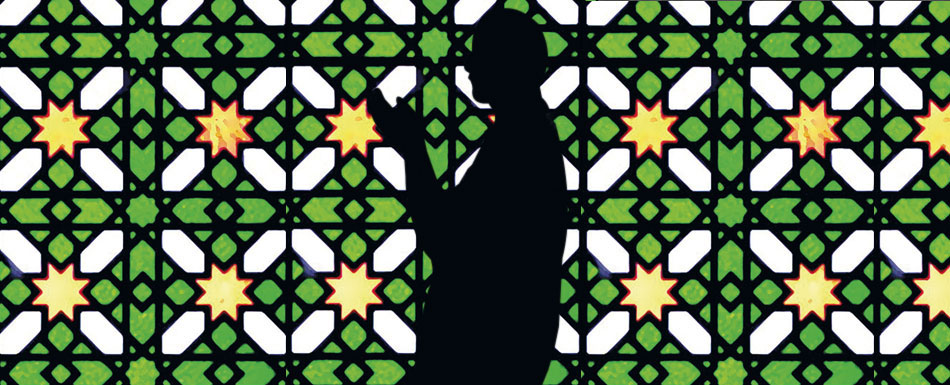
Sincerity
November 17, 2018
The two dynamics that keep religious life alive
January 19, 2019Building a society of noble ideals
The humans of this age have been victimized by a lack of idealism. Sometimes, in addition to lacking idealism, these individuals ignored their self-control and remained corrupt; some even went so far as to inflict destruction upon their environments, behaving like anarchists and nihilists so as to appear strong willed. These kinds of people have always been problematic. When disengaged, they are miserable. But when they spring into action, they endeavor to destroy religion, morality, and basic justice.

People of our age are the victims of living without a purpose or ideal. With no aspiration to follow, they have at times allowed their willpower to decay; at other times, they have unleashed it, but only to cause destruction to the values they once held dear, like peace and human dignity. When they were in a state of lethargy this has led them to self-destruct from within, and when they sprang into action, it was to raze to the ground values such as faith, ethics, and justice. So, both their withdrawal and involvement have always caused trouble.
These carnal beings are guided by the whims of desire instead of the wisdom of conscience. They are constantly piqued emotionally, but their hearts prefer daily gossip and small talk. They have no perspective, no new ideas, no code of conduct, and no significant projects for the future. At their times of weakness, they remain silent regarding almost every subject. But when they attain power, they attempt to express themselves through various means of destruction; and just like leaves scattered around with the coming of autumn, they are continuously swept from one place to another according to the direction of the winds; and occasionally those who pass by tread on these piles of leaves.
For many years, this dark and gloomy atmosphere virtually became a part of the nature of today’s people. Indeed, ever since this society willingly restricted its emotions, thoughts, and objectives, it was either overcome by an inferiority complex, or it raved with delirium. In both cases, it was a war waged against its distinctive identity. Unfortunately, even today this battle continues at full speed, just in a different dimension. While one half of the world pursues new projects in contemplation of a new age, the other half is still suffering amidst the vicious circles of old crises. Our thoughts are confused, our emotions repressed, our behavior inconsistent, and our hearts uncompassionate. The masses are mere puppets in the traps of the meaningless tides; the society pursues a different path, changing direction every day, and the guides are reckless. Each and every institution we study corrodes from within, and this makes us shudder. Indeed, it is almost impossible to observe a life of thought-or its morals, culture, art, politics, or law-without feeling the pangs of sorrow.
There are many nations that have shared a similar fate of oppression and injustice. They persist in competing among each other in undesired behavior. They secretly cause destruction amongst one another, and are constantly at war. The fate of this vast world might be a perpetual state where power dominates justice, and countries try to imitate one another in a race to the bottom. But in all honesty, it would be wrong to expect sparrows to win a victory lost by eagles…
This society is like a ship taking on water, and being damaged from within. To prepare this ship for the long journey ahead, we need courageous individuals who have been successful in protecting their faith, determination, and hope. They possess high ideals, their lives are devoted to permanent service, and they are prepared to make both material and spiritual sacrifices. They are determined individuals capable of eliminating oppression of the sorts suffocating society over the last few centuries. These brave souls bind their own salvation to being in the service of others, disregard their stability, and spread it like soil on the path of others’ happiness. They circulate in people’s veins as air and blood to give life to others. They overflow as waterfalls to subdue the scorching heat of those burning with longing. Their actions arise out of a sense of responsibility that lies as an aspiration deep in their soul. Their mercy goes far beyond the borders of personal accountability and their compassion is vast enough to embrace all of humanity.
With these qualities they will remind humanity of the spiritual essence it has lost. They will serve as an example to those idle souls who have whittled away the last few centuries bearing no ideals. The fate of humanity is unity, not division. Even if we close our eyes and ignore certain things, by embedding the common aspects between us into our minds, events attract us more towards the communal atmosphere of pleasure and sorrow rather than individual emotions. We are reminded in our consciences of our social collectiveness. Indeed, just as our every move involves everyone in one way or another, any incident occurring, even in the most remote corner of the earth, involves us, too. This solidarity is due to our universal humanity, our shared emotions and thoughts. We were destined to live together with others, and we were created to share and sympathize. Principally, if mankind could perceive that its nature has been programmed for this solidarity, then, by taking advantage of this fate, we can change the course of our world together. Once synchronized with our intentions and willpower, this natural flow will be enriched with new dimensions of reason, common sense, and free will. This will reveal the uniqueness of being human and will reward us for our choice and good intentions. Our willpower will be key that unlocks the ideal of an everlasting life.
Therefore, those who seek an everlasting life must bear the ideal of embracing others, so that they in turn may be embraced on the path towards eternity. On the contrary, just as the selfish, overly ambitious, and uncompassionate souls whose salvation depends upon the destruction of others were never capable of loving these “others,” they were themselves never loved. In addition, the pain of the injured and the devastation of the aggrieved have a greater effect on those who actually suffer these afflictions. An individual who is privileged enough to sacrifice for others is respected by all, even those besieged by loss and sorrow.
Those who behave selfishly and without compassion are condemned to remain prisoners in their individual worlds; they will never experience the vastness of true collectivity. These selfish humans are little more than living corpses who suffer nothing but misery between the course of life and death. They are only deceiving their own souls and consciences by eliminating the true values of being human.
The true life is planned for the generations of today and the future; an ideal life lived for noble causes, a life lived for others. Every step of this life is suffused with this collective awareness. The reflection of this kind of life is a full-length mirror of the characteristics that define a real human; it is the peak of perfection. Those who can look with wisdom can easily see behind this reflection a profound and intimate connection with the whole of existence. In this reflection, one observes both himself and others with the eyes of the heart and perceives with the appreciativeness of the conscience. Therefore, just as individuals have a sounder connection with their own spiritual worlds, they also attain the ability to observe and grow familiar with their surrounding environments; they see that everything appears to be kinder and more reasonable.
However, it is impossible to achieve this transformation overnight. This is the manifest of compassion which emerges following a long fermentation process within the depths of our souls, and a call to humanism in the language of the heart. This call surges from spiritual souls, spreading its own colors into the environment; over a period of time, it begins to ensure that everything speaks in its own language. As this emotion ascends directly from the heart, it can never be affected by exterior influences and parasites which pollute the entire environment.
This call is most fitting to be welcomed in the heavens and the earth, for it is faith-inspired and grace-filled. One day, the residents of spiritual realms will honor this call and the gates to the heavens will be opened to usher it in with praise and courtesy. Then, all the hearts will beat with compassion, think with compassion, speak with compassion, act with compassion, and embrace the whole world with compassion… And I believe on that day, when the earth has become a radiant reflection of compassion, we will embrace life and encourage others to embrace life with more sincerity. By completely escaping miserliness in showing others the path to eternity, by observing the inner spirits of both ourselves and others, we will have reached the spiritual capability of perceiving from a much different angle. By not being satisfied solely with the good ideas we are capable of accomplishing, we will also strive to attain the goodness and kindness beyond our capability. And when the inaccessible becomes accessible, it will roar with the gratitude of benefaction; and those transcendent ideals will inspire us with hope and anticipation.
A spiritual level like this, which asserts an individual’s own limits through the devotion of kindness, must be the deepest, most remarkable aspect of a person. In the eyes of God, and in the eyes of other people, these individuals will reach an esteem of exceptional superiority, and will undoubtedly gain the favor of being the perfect creation due to this depth. Their affection felt towards everyone is a result of their sound relationship with God and it is an ideal at the personal level. It is a sublime ideal at the national level to pray for the nation’s glory even at the cost of one’s own life. And it is a transcendent ideal to utter the words, “I am ready to burn in the hellfire if only I could see the faith of my nation has been ensured.” It is an ideal founded upon an all-encompassing sense of responsibility, mercy, and universal compassion to say, “My Lord, forgive my people, for they do not know,” to those who have even gone as far as to threaten to kill.
Our present society needs courageous individuals of such noble ideals. It needs brave idealists capable of holding their hands out with a sense of compassion to their own nation, and then to the whole of mankind. We need these courageous idealists who pray for the good of others every time they hold their hands up in supplication. And as nobody else can, or will fulfill such a major demand, it is our duty to voice and enforce this amongst ourselves…
This article has first appeared in the 105th issue of Fountain Magazine (May – June 2015). The Fountain can be reached online at http://www.fountainmagazine.com




